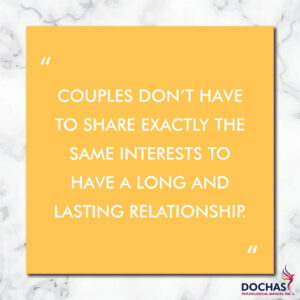Does this sound familiar? You and your partner want to spend time together, but you don’t seem to share many common interests – such as your taste in music, favourite restaurants, which sports team to cheer for, or your ideas about the perfect date night. It can leave you feeling bummed out about the fact that you and your partner don’t seem to agree on how to spend time together, and you might even question if you’re truly compatible.
You might start to worry if conversations with your partner lead to arguments about who gets to choose the movie this time. Or maybe you feel frustrated because you agree to do what the other one wants most of the time.
But don’t lose hope! You can still have a strong relationship even when you don’t necessarily share the same interests. Experts suggest that couples don’t have to share many of the same interests to have a long and lasting relationship. If you share many of the same core values, your relationship has a stronger foundation than if it’s based purely on a similar taste in music, or other interests that might shift throughout life. That said, you still want to be able to spend quality time together.

Here are some tips to help you and your partner connect when you don’t seem to share many common interests:
Compromise.
If you already know that there’s no possible way you’ll find yourself wanting to learn how to cook extravagant dishes, or learning how to golf, talk with your partner about what you both love to do, and see if it’s possible to spend time together while doing the things that both of you enjoy. Maybe one of you knits while the other cooks, for example. This way you’re still spending time together without both doing the exact same activity.
Agree to Disagree.
If you really can’t see yourself agreeing to do something that your partner loves, determine if It’s one of those things that you or your partner should do separately. If your partner loves running and you just can’t get into it no matter how much you try, it can be one of those things that your partner does without you. Having separate interests and spending time apart from one another can be healthy and beneficial for relationships.
Explore new ways to connect.
If the interests you and your partner actually agree on are limited, consider trying something new with your partner. Maybe you both can agree that you both enjoy being outdoors, so you agree to try rock climbing together for the first time. Trying something new can be a wonderful bonding experience that can create lasting memories for you and your partner (even if you both agree that you never want to go rock climbing again.)
Recreate the memories that brought you together.
Maybe your partner’s new hobby really isn’t your cup of tea. Can you think back to a time where you and your partner enjoyed spending time together? Maybe it was your first date (and maybe you can even remember that you didn’t like the menu, but you enjoyed time with your partner just to talk one on one). Try to recreate what you loved about these moments.
Connect over shared values.
What is it that drew you to your partner, and what holds your relationship together? Maybe it’s the fact that you share the same values. While you may not share many of the same interests, you and your partner both value time spending time together as a couple, or maybe you both value family, loyalty, or faith. Reflecting on the values you share with your partner can encourage positive feelings and connection within the relationship.

Don’t be Afraid to Ask for Help.
Those were some tips about what to do if you don’t seem to share many common interests! If you and your partner just can’t seem to agree on anything, despite trying your best, consider seeking professional help from a licensed therapist. Perhaps you and your partner are struggling with communicating or connecting on a meaningful level. You and your partner don’t necessarily need to be struggling or experiencing conflict to benefit from therapy. A therapist can provide a non-judgmental space for to rediscover their connection and learn how to compromise with one another other in meaningful ways.
Some other resources to check out:
When Your Interests Don’t Align—How to Connect with Your Partner
Experts Say You Don’t Have To Have These 9 Things In Common For Your Relationship To Last
About Dóchas Psychological
Dóchas Psychological Services is a well-established and trusted therapy clinic located in Spruce Grove, Alberta. At Dóchas we value the idea that everyone deserves a safe space. Through connection and education, our team works hard to build a trustworthy relationship with each of our clients. It is our goal to create a community for our clients to feel like they belong.
Disclaimer
Information provided through Dóchas Psychological Services blogs or vlogs is meant for educational purposes only. They are NOT medical or mental health advice. You can read more about our disclaimer here.









